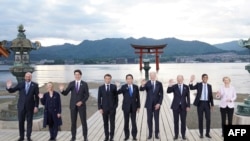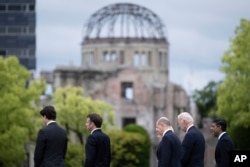State-backed Chinese mouthpiece Global Times on Monday called the Group of Seven summit an "anti-China workshop," after Beijing summoned Japan's envoy and berated Britain in a fiery response to statements issued at the weekend G7 summit in Hiroshima.
A joint communique issued on Saturday singled out China on issues from Taiwan and nuclear arms to economic coercion and human rights abuses, underscoring the wide-ranging tensions between Beijing and the group of rich countries that includes the United States.
"The US is pushing hard to weave an anti-China net in the Western world," Global Times said in an editorial on Monday titled 'G7 has descended into an anti-China workshop.'
"This is not just a matter of brutal interference in China's internal affairs and smearing China, but also an undisguised urge for confrontation between the camps," the editorial continued.
Beijing's foreign ministry said it firmly opposed the G7 statement and late Sunday said it had summoned Japan's ambassador to China as part of a pointed protest to the summit host.
Russia, a close ally of China that was also called out in the G7 statement over its invasion of Ukraine, said the summit was an "incubator" for anti-Russian and anti-Chinese hysteria.
Separately, China's embassy in Britain on Sunday urged London to stop slandering China, after British Prime Minister Rishi Sunak said Beijing represents the world's greatest challenge to security and prosperity.
The communique issued by the G7, which also includes Canada, France, Germany and Italy, mentioned China 20 times, the most in recent years and up from 14 mentions in 2022.
As well as taking issue with G7 comments on Taiwan, which China claims as its own and says is an internal issue, Beijing also accused the United States and its allies of double standards over comments about nuclear buildup and the use of economic leverage.
Despite Beijing's reaction, U.S. President Joe Biden said he expected a thaw in frosty relations with China "very shortly."
Some analysts, however, see no sign of any immediate easing of tensions, especially given Beijing's rapid rebuttal.
"Beijing’s reaction — especially the early timing of its release — underlines that tensions in the region are already quite high and likely to increase further," Moritz Rudolf, research scholar and fellow at Yale University's Paul Tsai China Center.
Japan backlash
Chinese Vice Foreign Minister Sun Weidong summoned the Japanese ambassador to register protests over "hype around China-related issues," a ministry statement late on Sunday said.
Japan's ambassador to China, Hideo Tarumi, said it was natural for the G7 to refer to issues of common concern as it has done in the past and will continue to do so in the future as long as China does not change its behavior, according to a readout.
Wang Yiwei, an international relations professor at the Renmin University in Beijing, described China's overall reaction to the G7 communique as "restrained" but singled out Japan as particularly provocative.
Wang referred to Japan's summit venue, Hiroshima, the city flattened by an atomic bomb at the end of World War II, and its push for a joint statement on nuclear disarmament that raised concern about China's nuclear arsenal.
"The main thing that's happening here is Japan, using its position as the rotating chair, to create an anti-China movement," Wang said.
Among the G7, Tokyo has also voiced some of the strongest concerns about China's muscular rhetoric around Taiwan, the democratic island that sits to the southwest of Japan.

